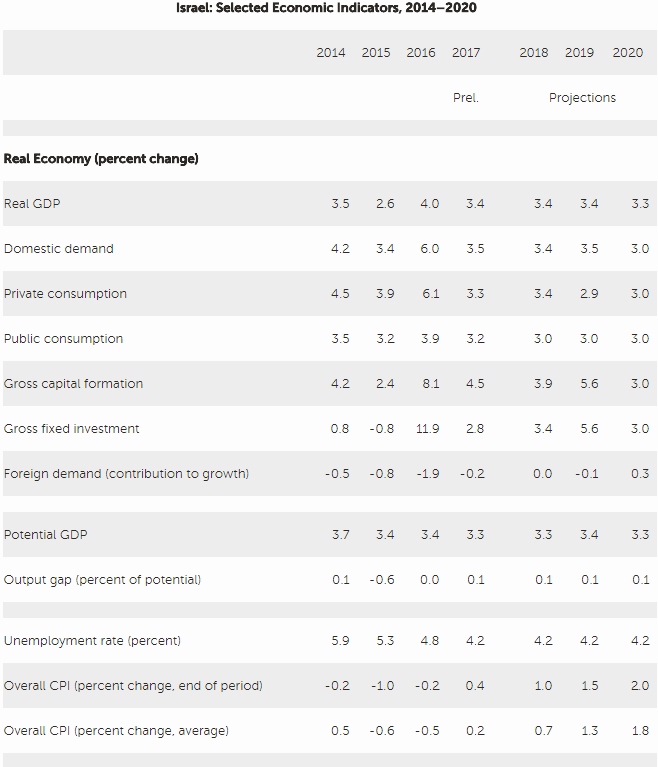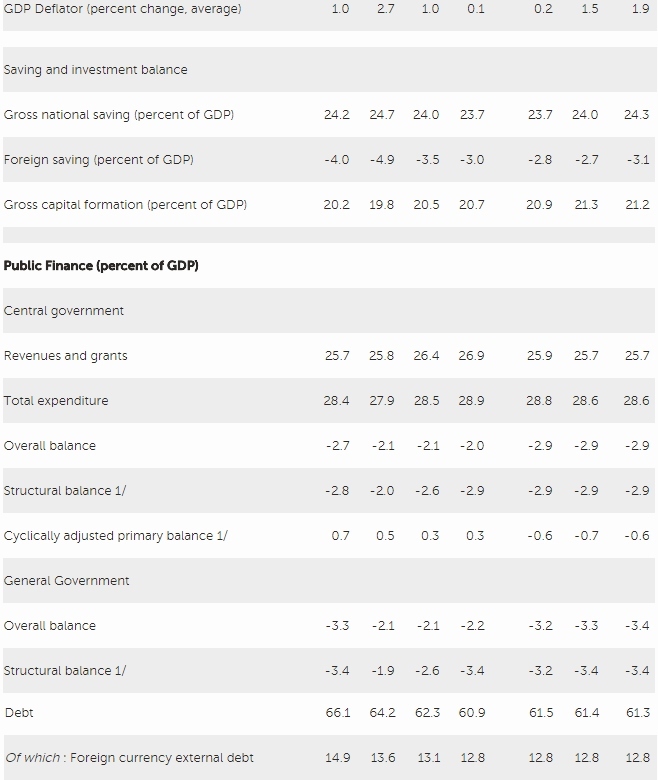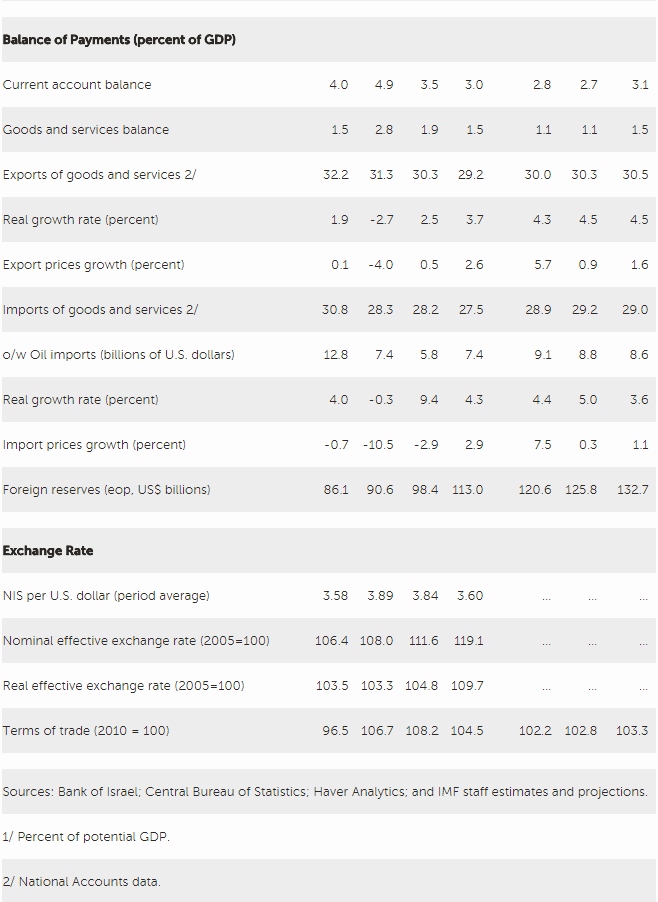Israel: IMF Executive Board Concludes 2018 Article IV Consultation
On April 30, 2018, the Executive Board of the International Monetary Fund (IMF) concluded the Article IV consultation with Israel, and considered and endorsed the staff appraisal without a meeting.
Israel is enjoying strong economic growth, at 3.4 percent in 2017, supported by solid domestic demand and higher global growth. Unemployment has declined steadily, to below four percent in early 2018, supporting broad-based wage growth. Nonetheless, inflation remains below the
1–3 percent target range of the Bank of Israel (BoI), reflecting the appreciation of the shekel, increased competition including internet shopping, and government measures to lower the cost of living. The BoI has held the policy rate at 0.1 percent since February 2015 and has stated that monetary policy in Israel will remain accommodative as long as necessary to entrench inflation within the target range. Israel’s fiscal deficit was two percent of GDP in 2017—but 2.9 percent excluding one-off revenues—and public debt declined to 61 percent of GDP.
Israel’s growth is expected to reach about 3.4 percent in 2018 and remain around this level in the next few years owing to the completion of major projects. Domestic and international conditions are supportive of an increase in inflation, yet significant uncertainty remains around the timing of such a rise. Housing price increases have slowed to only two percent alongside a decline in turnover, but housing affordability remains a problem. In the longer term, however, Israel faces challenges to growth and stability from modest productivity growth despite its dynamic high-tech sector, sizable infrastructure needs that are especially evident in high traffic congestion, and high poverty partly reflecting the lower skills and labor participation of population groups that will rise as a share of the working age population in coming decades.
Executive Board Assessment
In concluding the 2018 Article IV consultation with Israel, Executive Directors endorsed the staff’s appraisal as follows:
Israel’s strong macroeconomic conditions offer an opportunity to implement further reforms to sustain strong and inclusive growth. Growth of almost 3½ percent in 2017 helped bring unemployment below four percent. But core inflation remains below the 1–3 percent target range. Growth is expected to remain at about 3½ percent in the next few years thanks in part to the completion of major projects, before moderating to around three percent. But in the longer term, a rise in population share of groups with lower labor productivity and participation combined with sizable infrastructure needs could weigh on Israel’s growth potential and raise poverty.
Monetary policy should remain accommodative pending a durable rise in inflation and inflation expectations. The BoI maintained an appropriately accommodative stance in 2017 given low inflation and the spillovers from easy monetary policies in major advanced economies. The BoI’s guidance that policy will remain accommodative as long as necessary to entrench the inflation environment within the target range has also helped anchor long term inflation expectations. Yet, with expectations for the next few years below or close to the lower target bound, policy tightening should wait until inflation is clearly heading back to target, with the pace of eventual rate hikes being data driven. The external position is broadly in line with fundamentals and desirable policy settings. Given comfortable foreign reserves and with the economy at full employment, exchange rate flexibility should continue to be the first line of defense in the event of external shocks, with foreign exchange intervention limited to addressing disorderly market conditions, which may arise from significant exchange rate deviations from fundamentals.
Reinforcing the financial stability framework is critical to complement the progress being made on enhancing competition. Measures being implemented by the authorities are expected to strengthen competitive pressures. Already, the sources of credit are shifting, making it urgent to approve legislation to establish the FSC to avoid gaps in financial system oversight. Entry by new banks would be welcome, with appropriate deposit insurance and resolution arrangements to contain fiscal costs from potential failure. Banking supervision should continue its efforts to operationalize a risk-focused approach and the adoption of Solvency II by the CMISA is welcome. Financial regulators should harmonize regulations in areas of overlapping activity to avert regulatory arbitrage. Safeguarding the operational independence of financial regulators remains critical to their effectiveness. Slowing housing construction despite still high housing prices calls for continued reforms to make supply more responsive to needs and to improve housing affordability.
Fiscal policy should support Israel’s growth potential while building buffers. In 2018 fiscal reserves are allocated to welcome subsidies for after-school childcare, but an expansion of disability benefits should be coupled with a reform of eligibility requirements and testing for new entrants to protect labor participation and contain fiscal costs. The 2019 budget supports technical training in schools and expands the EITC, but adhering to the former deficit target of 2.5 percent of GDP is preferable to gradually reduce debt in normal times. Ensuring the Buyer’s Price program is temporary would also support Israel’s fiscal health.
Stronger public investment management would help address infrastructure needs and adequate fiscal buffers must be preserved. The development of an integrated long-term national infrastructure strategy through 2030 is welcome. An immediate priority is to ensure that the existing infrastructure is efficiently utilized through demand management tools. The framework for managing infrastructure investment needs to be strengthened to ensure investments are high‑quality and timely. If public investment is increased, any rise in the public debt ratio should be modest and temporary, with liabilities from PPPs managed carefully and reported in line with international best practices. The low level of Israel’s civilian spending, together with reform needs in education, training, and active labor market policies, indicate that revenues should be the main source of non-debt financing, focusing on reducing tax benefits to limit the drag on growth.
Fundamental upgrades of the business environment are critical, especially reducing bureaucratic bottlenecks. Progress on electricity sector and other reforms is welcome and reforms should continue, including replacing trade barriers on agricultural products with targeted subsidies. Numerous regulations and their high compliance costs remain major impediments to competition and investment, calling for simple and timely administration of regulations, such as a
“one-stop shop” that would assess all regulatory requirements within a reasonable period. All proposals for new regulations should be subject to robust regulatory impact assessments. The lengthy process of contract enforcement indicates a need to make court procedures more efficient, and the establishment of a specialized court for complex antitrust cases would support competitive markets.
The government should undertake deep reforms of education and training to reduce the gaps in labor productivity and participation while enhancing redistribution carefully. The effectiveness of schools should be increased, such as through higher standards for teachers, covering core subjects at all grades in Haredi schools, improving Hebrew teaching in Arab schools, and extending the short school day. Enhanced vocational training can also play a large role in reducing skills gaps with expanded active labor market policies further aiding employability. To raise labor participation and work hours of women, childcare support needs to be further expanded, especially for younger children, and increases in the female retirement age should continue without introducing new incentives for early retirement. Alongside enhancing public transportation, enabling workplaces to locate near communities would promote labor participation. Inequality and poverty can be reduced while supporting participation by substantially expanding the EITC and implementing it more effectively, with fiscal costs contained by making transfers more targeted.
It is proposed that the next Article IV consultation with Israel take place on the standard 12-month cycle.



Source: International Monetary Fund
- 273 reads
Human Rights
Fostering a More Humane World: The 28th Eurasian Economic Summi

Conscience, Hope, and Action: Keys to Global Peace and Sustainability

Ringing FOWPAL’s Peace Bell for the World:Nobel Peace Prize Laureates’ Visions and Actions

Protecting the World’s Cultural Diversity for a Sustainable Future

Puppet Show I International Friendship Day 2020

